Beijing orchestra makes impressive showing in Chicago debut
For a city of Chicago’s size and musical significance, the number of visiting orchestras has been oddly sparse in recent seasons. This month, the Leipzig Gewandhaus and San Francisco Symphony are both on extended U.S. tours, and neither has been booked in Chicago.
Instead on Sunday afternoon Symphony Center Presents brought the China National Centre for the Performing Arts Orchestra to town, led by Lü Jia with Yuja Wang providing the soloistic sizzle.
The orchestra is only four years old, created as house ensemble for the architecturally striking National Performing Arts Centre, which opened in central Beijing in 2010. The China NCPA Orchestra presents a series of concerts, yet its main responsibility is pit band for the center’s opera and ballet performances. (This first U.S. tour marks the 35th anniversary of official U.S.-Chinese diplomatic relations.)
Even without a famous name or venerable pedigree, the Chinese musicians gave an impressive accounting of themselves Sunday afternoon at Symphony Center. The ensemble is not entirely consistent across all sections, with the some winds and brass shaky under pressure. Still, for the most part, the Chinese musicians played with fine fire and admirable cohesion under chief conductor Lü Jia.
The afternoon led off with the sole Chinese music on the program, Qigang Chen’s Wu Xing (The Five Elements). Written in 1999, this suite for orchestra is surprisingly edgy and “modern” in style, written for large orchestra and exploring a wide range of contrasting timbres and dynamics representing the five elements. There are violent crescendoes, some luminous impressionistic nature painting and much copious use of percussion with some artful writing for flute and violin that evoke the traditional Chinese dizi and erhu.
Qigang’s work is scored with skill and panache and, though Wu Xing ultimately adds up to something less than the sum of its parts, Jia drew polished and explosive playing in an alert and concentrated performance.
The orchestra was heard to even better advantage, somewhat surprisingly, in Dvorak’s Symphony No. 8. Lü Jia clearly has a feel for how this music should go and he brought out the Bohemian’s composer’s pastoral lyricism as idiomatically as the eruptive energy.
The orchestra’s strings are especially impressive, and Jia drew a notably rich opening statement from the Beijing cello section. The middle movements were well done, with Jia idiomatically charting the Adagio from its pensive opening to a resounding climax.
The louder the music, the more unkempt the playing sometimes turned, with fitfully garrulous tuttis. But for the most part this was a strong and impassioned Dvorak played with fine energy and conviction by the Chinese musicians, with a brilliant high-adrenaline finale. Enthusiastic ovations brought Jia back out for a fiery encore of Dvorak’s Slavonic Dance in A flat, Op. 46, no. 3.
Yuja Wang, now an international star, provided the glamorous centerpiece of the afternoon– clad in a form-fitting red dress slit to there— joining her compatriots in Ravel’s Piano Concerto in G.
In fact, Wang’s generous thigh flashing was the most successful element of her Ravel performance. Yes, the Chinese pianist can do it all, with her relentless speed and full-metal technique like a dangerous weapon.
But surely there’s more to this music than Wang’s lightning dash through the first movement, her hyper-aggressive virtuosity making the music sound more like Prokofiev than Ravel. Similarly Wang’s attempt to set a land speed record in the Presto was superficially exciting yet blew past the score’s quirky humor and piquant touches.
Oddly, the slow movement went best, Wang taking her high-heeled foot off the accelerator for a poised if cool account of the Adagio’s arching cantilena. Jia and his orchestra provided close if occasionally rough support, the woodwind playing not always up to international standards.
Yet Wang’s’s solo encore of Art Tatum’s jazzy bravura take on Vincent Youmans’ Tea for Two was as charming, playful and delightful as her Ravel was cold, aggressive and soulless. Go figure.
Posted in Uncategorized
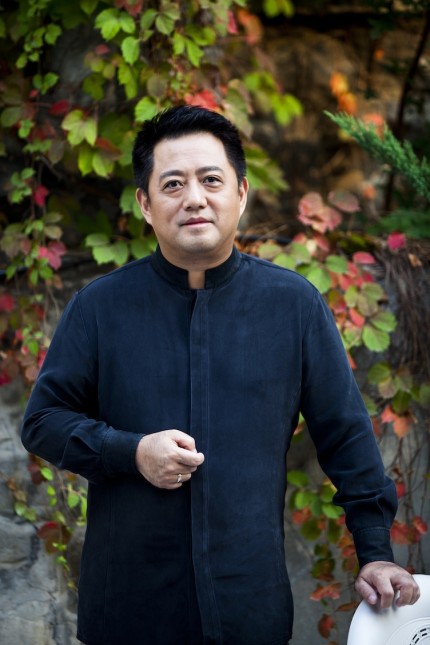
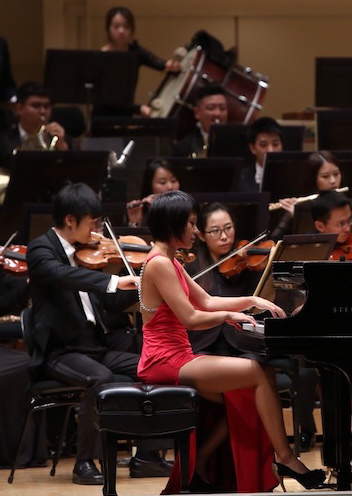
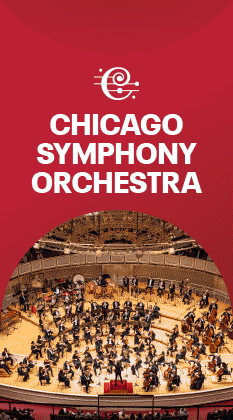
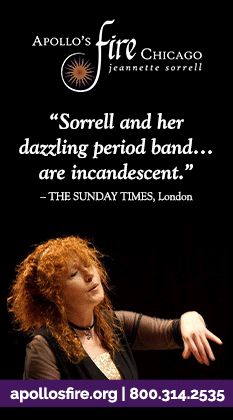
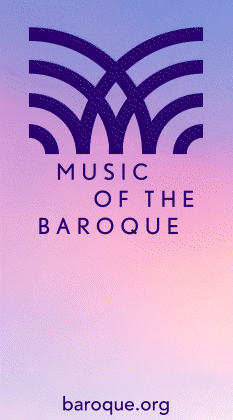
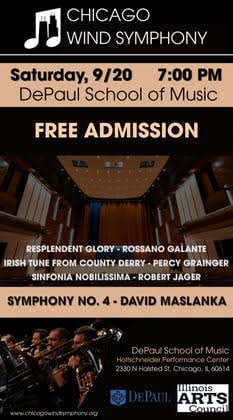
Posted Nov 04, 2014 at 2:55 pm by Priscilla
When they are coming back to Chicago again? It won’t be a bad idea to have annual performance in Chicagoland!
Posted Nov 04, 2014 at 8:43 pm by Lin
I went to see the performance. Jia’s deep understanding of the music for Dvorak No. 8, his tight control over the movement of music, speed change, and his passion are really world class. If he conducts a better and more mature group, i bet the performance will be as good as CSO. Jia Lu obtained his fame and accomplishment in Europe. He would be a star if he conducts here in US.
Posted Nov 09, 2014 at 1:56 pm by Gong Qian Yang
A few days passed quickly… I still remember the concert vividly. Lu Jia clearly is a world class conductor. Hope he comes back to Chicago again, maybe with CSO next time? I sure will buy tickets to go. He showed tight grip of the orchestra technically, while from time to time enjoyed himself with the players, especially in Dvorak’s Symphony No. 8. Yuja Wang’s piano performance of Ravel was all the time at ease, even in 3rd movement with extra fast tempo. She probably will slow down a little bit when she gets older? Who knows. Anyway, it’s a delight to hear.